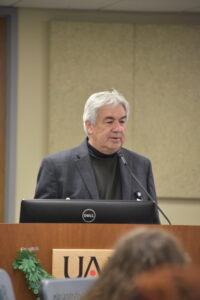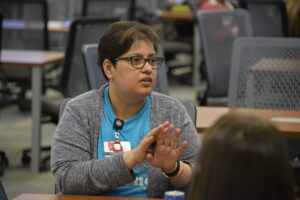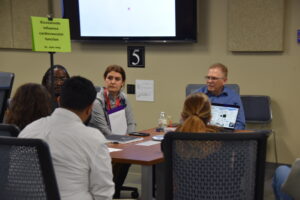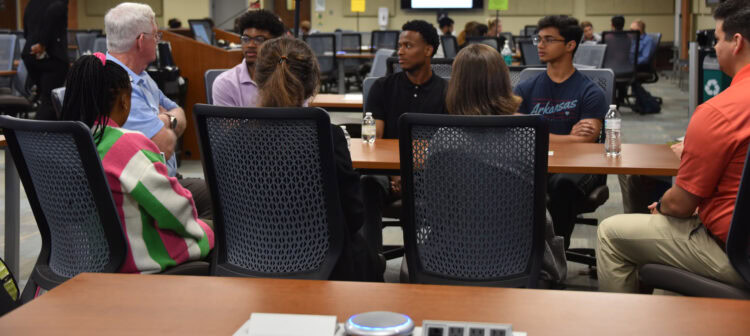View Larger Image
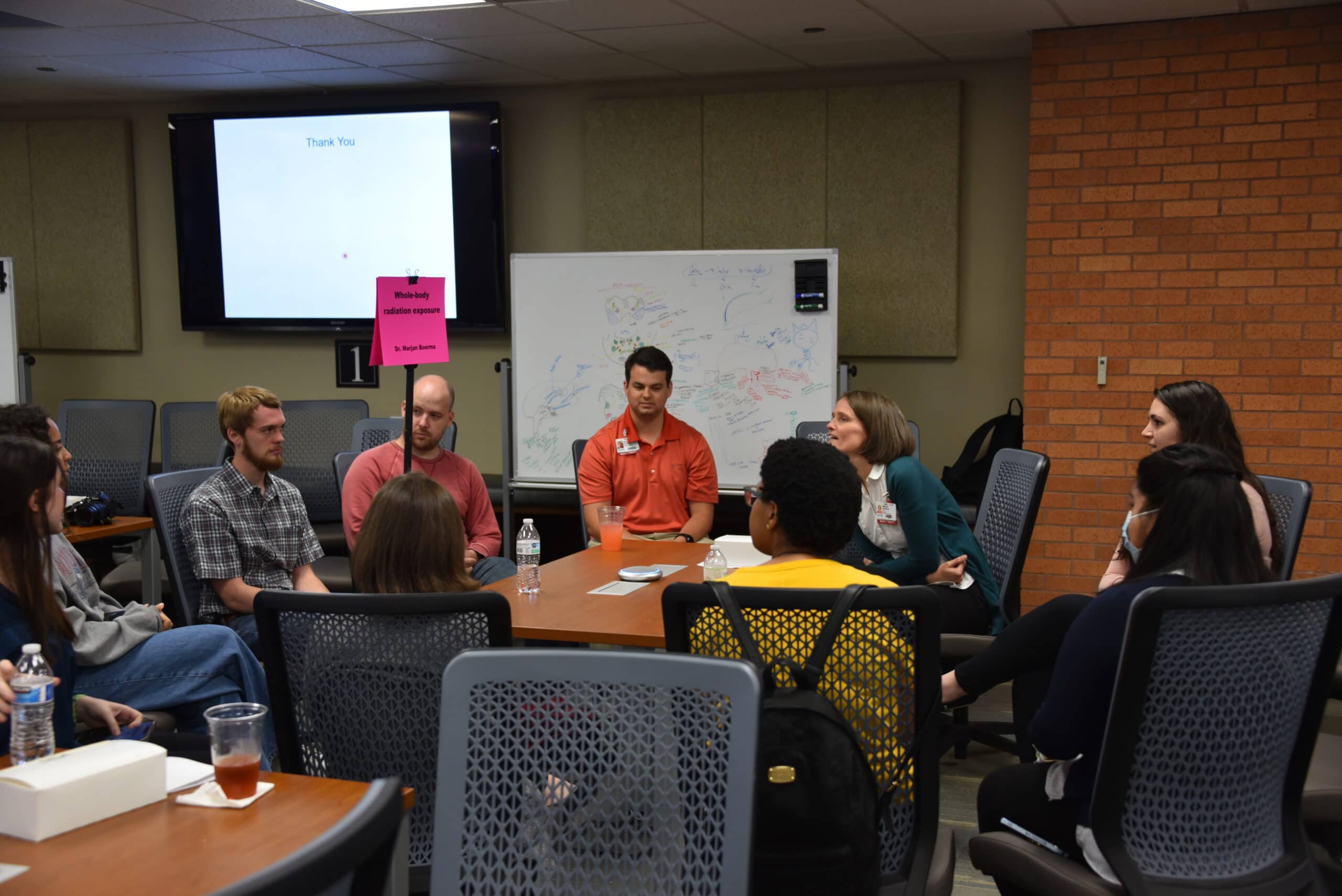
Marjan Boerma, Ph.D., conducts a discussion during the INBRE Workshop.
Image by Nathan Tidwell
INBRE Workshop Takes a Look at Cardiovascular Disease
| Arkansas INBRE (IDeA Networks of Biomedical Research Excellence) hosted undergraduate students, postdoctorate fellows and staff May 22 for another in a continuing series of day-long workshops at the University of Arkansas for Medical Sciences (UAMS).
UAMS physicians and researchers gave presentations and conducted group discussions with the attendees on cardiovascular disease cases and clinical issues regarding treatment, the effects of radiation on the cardiovascular system, cardiovascular pathophysiology, and how fatty acids affect cardiovascular function.
The group also heard from UAMS’ Graduate School leadership about program opportunities.
“You’re in for a real treat,” said workshop organizer Thomas Kelly, Ph.D., INBRE Liaison for Primary Undergraduate Institution faculty and a professor in the College of Medicine Department of Pathology. “I know a lot of you are interested in going to medical school, and here’s a chance to ask questions of actual physicians.”
Jerry Ware, Ph.D., INBRE associate director and professor in the College of Medicine Department of Physiology and Cell Biology, gave an overview.
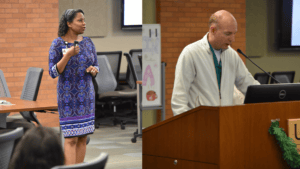
Allison Shaw, M.D., and Taufiek Konrad Rajab, M.D., speak about cardiovascular treatment and research advances.Image by Nathan Tidwell
“This is the sixth year of this workshop. We’re trying to expose you to how research goes from a laboratory situation to helping in the clinic. Each year we have focused on a different health problem,” Ware said from the Active Learning Center. “UAMS is like a three-legged stool — one leg is the hospital, one leg is the educational component, and one leg is research. That’s what makes UAMS unique.”
Previous workshops have focused on cancer research, infectious diseases, obesity and diabetes, and opioid addiction.
Allison Shaw, M.D., an assistant professor in the College of Medicine Division of Cardiovascular Medicine whose specialty is general cardiology, spoke about her daily work.
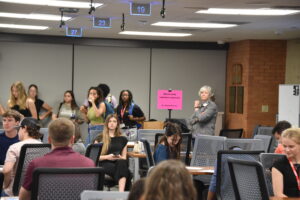
Undergraduate students, postdoctorate fellows and staff at the sixth INBRE day-long workshop.Image by Nathan Tidwell
“When we talk about general cardiology, that basically means I do a little bit of everything. I see patients with a variety of illnesses — most present with either chest pain, shortness of breath or palpitations,” said Shaw. “We use research in almost everything we do from the testing we perform on patients to the drugs we administer. It’s what we call evidence-based medicine. Research helps us to help patients.”
Taufiek Konrad Rajab, M.D., an assistant professor in the College of Medicine Division of Pediatric Cardiovascular Surgery who practices at Arkansas Children’s Hospital, discussed research regarding infant heart valve replacement.
“We have excellent outcomes with heart valve replacements in adults. The problem with infants is the child grows but the heart valve does not grow with them, so you have to keep operating until they become an adult,” Rajab said. “The idea we’ve come up with is to transplant the part of the heart that contains the valve, which we call a partial heart transplant. The advantage is the partial heart transplant grows just like a regular heart.”
The workshop contained morning and afternoon sessions with the following researchers and their focus:
- Rushita Bagchi, Ph.D., an assistant professor in the Department of Physiology & Cell Biology, researches cardiovascular pathophysiology and gene transcription.
- Marjan Boerma, Ph.D., professor of Pharmaceutical Sciences in the College of Pharmacy and director of the division of Radiation Health, researches the cardiac side effects of radiation therapy, and the cardiovascular effects of low- and high-linear energy transfer radiation to mimic exposures during deep-space travel.
- John Imig, Ph.D., professor and chair of the Department of Pharmaceutical Sciences in the College of Pharmacy, is dedicated to understanding the mechanisms by which certain fatty acids (eicosanoids). He and his team have developed novel eicosanoid-based drugs to treat hypertension, stroke and heart attacks.
- Jerry Ware, Ph.D., professor of Physiology & Cell Biology, provided an overview of the current anti-thrombotic approaches to reduce heart attacks and stroke.
“I really enjoy this. We can give students the opportunity to see the exciting research we’re doing at UAMS and how it can impact treating cardiovascular disease,” Imig said.
Graduate School Dean Sean Taverna, Ph.D., and Karl Boehme, Ph.D., an associate professor in the College of Medicine Department of Microbiology and Immunology and the director of the Graduate Program in Interdisciplinary Biomedical Sciences (GPIBS), discussed the graduate school.
“We have around 250 students in Graduate School programs — you could be one of them,” said Taverna.
“The GPIBS program has everything from neurobiology to microbiology to immunology to pharmacology — you name it we have it. Whether you want to go to graduate school or medical school, research is important,” Boehme said.
Students expressed appreciation for the workshop.
“Dr. Rajab’s talk was very interesting,” said Kennedy Abanihe, a University of Arkansas at Pine Bluff student who is interested in becoming an anesthesiologist. “The workshop is very fulfilling.”
“This is great — I came here last year,” said Wyatt House, who is studying biomedical sciences at Ouachita Baptist University. “I love the ability of going from the lab to seeing how things are implemented in the clinic.”
Kylee Sabella is studying biology at Lyon College.
“I feel like I’ve learned a lot of things. It’s fun to integrate what I’ve learned at college to what I’m hearing here,” she said.
“This has been really good,” said Alyssa Whisler, who currently attends Tennessee State University and is part of UAMS’ Summer Undergraduate Research Program. “Dr. Bagchi is my mentor and asked me if I wanted to come. It’s been a great experience.”
